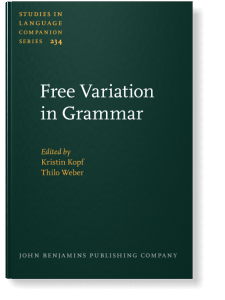Free Variation in Grammar
Empirical and theoretical approaches
Editors
e-Book – Open Access 

ISBN 9789027249333
Recent years have seen a growing interest in grammatical variation, a core explanandum of grammatical theory. The present volume explores questions that are fundamental to this line of research: First, the question of whether variation can always and completely be explained by intra- or extra-linguistic predictors, or whether there is a certain amount of unpredictable – or ‘free’ – grammatical variation. Second, the question of what implications the (in-)existence of free variation would hold for our theoretical models and the empirical study of grammar. The volume provides the first dedicated book-length treatment of this long-standing topic. Following an introductory chapter by the editors, it contains ten case studies on potentially free variation in morphology and syntax drawn from Germanic, Romance, Uralic and Mayan.
[Studies in Language Companion Series, 234] 2023. vi, 352 pp.
Publishing status: Available

© John Benjamins
Available under the Creative Commons Attribution (CC BY) 4.0 license.
For any use beyond this license, please contact the publisher at [email protected].
Table of Contents
-
Chapter 1. Free variation, unexplained variation?Thilo Weber and Kristin Kopf | pp. 1–20
-
Section 1. Identifying and measuring free variation
-
Chapter 2. How free is the position of German object pronouns?Markus Bader | pp. 22–47
-
Chapter 3. Optionality in the syntax of Germanic traditional dialects: On (at least) two types of intra-individual variationAnn-Marie Moser | pp. 48–73
-
Chapter 4. Non-verbal plural number agreement. Between the distributive plural and singular: Blocking factors and free variationKarolina Rudnicka and Aleš Klégr | pp. 74–98
-
Chapter 5. ‘Optional’ direct objects: Free variation?Vilma Symanczyk Joppe | pp. 99–164
-
Section 2. Free variation and language change
-
Chapter 6. Variation and change in the Aanaar Saami conditional perfectMerit Niinemägi | pp. 168–201
-
Chapter 7. Stability of inflectional variation: The dative of the indefinite article in Zurich GermanAnja Hasse | pp. 202–228
-
Chapter 8. Resemanticising ‘free’ variation: The case of V1 conditionals in DutchJulie Nijs and Freek Van de Velde | pp. 229–257
-
Section 3. Free variation? Look harder!
-
Chapter 9. Syntactic priming and individual preferences: A corpus-based analysisMalte Rosemeyer | pp. 260–283
-
Chapter 10. Optionality, variation and categorial properties: The case of plural marking in Yucatec MayaYidong Yu | pp. 284–314
-
Chapter 11. Variation of deontic constructions in spoken Catalan: An exploratory studyRoser Giménez García, Sheila Queralt and F. Xavier Vila | pp. 315–349
-
Index | pp. 351–352
Subjects
Main BIC Subject
CFK: Grammar, syntax
Main BISAC Subject
LAN009060: LANGUAGE ARTS & DISCIPLINES / Linguistics / Syntax
